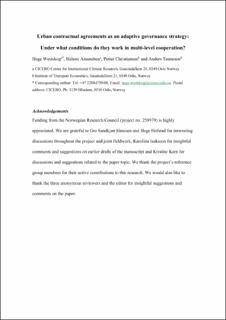Urban contractual agreements as an adaptive governance strategy: under what conditions do they work in multi-level cooperation?
Journal article, Peer reviewed
Accepted version
Date
2020Metadata
Show full item recordCollections
- Journal articles [478]
Original version
Journal of Environmental Policy and Planning. 2020, . 10.1080/1523908X.2020.1784115Abstract
The Norwegian urban growth agreement (UGA) is a governance platform combining transport-infrastructure development with land-use and transport policy. It is a policy package of measures involving network cooperation between national, regional and local government levels established to coordinate transport and land-use development. Shared responsibility for goal achievement, autonomy and learning and adaptation as new knowledge and experience arise are clear prerequisites for the UGAs. This makes it relevant to investigate the conditions for the UGAs to work as an adaptive governance strategy because their central features are in line with the attributes of adaptive governance. Further, adaptive governance is an approach to handle complex problems like transport development issues. The study shows that UGAs have several strengths in terms of autonomy and learning. However, the multi-level cooperation in the UGAs is framed by complex underlying structures of roles and powers, which challenge the working and legitimacy of the governance structures. Multi-level adaptive governance processes like the UGAs require attention to issues of power and legitimacy. Securing transparency and democratic anchorage is paramount in bringing such processes in line with the intended benefits of adaptive governance.
